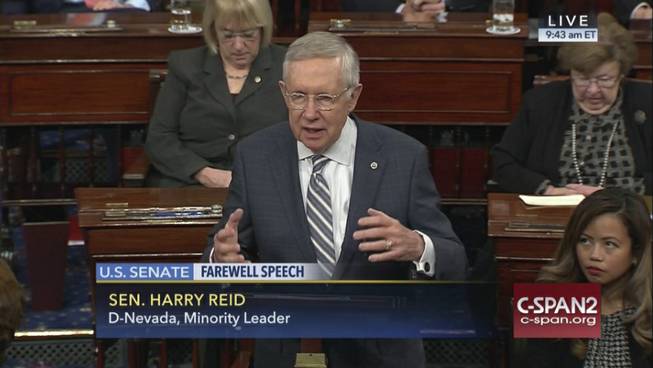
C-SPAN2 / AP
This image provided by C-SPAN2 shows retiring Senate Minority Leader Harry Reid of Nevada giving his final speech on the Senate floor on Capitol Hill in Washington, Thursday, Dec. 8, 2016.
Monday, Dec. 19, 2016 | 2 a.m.
1968: Elected to Nevada State Assembly at age 28, serving until 1970. Reid quickly built a reputation as a consumer advocate and introduced the state's first air-pollution legislation.
1971-1975: Served as lieutenant governor of Nevada. He won at age 30, the youngest in state history.
1974: Defeated in his first bid for the Senate by Nevada Gov. Paul Laxalt, by 611 votes.
1975: Ran an unsuccessful campaign for Las Vegas mayor.
1977-1981: Served as chairman of the Nevada Gaming Commission.
1978: Jack Gordon tried to bribe him with $12,000 to make two new casino games legal. Reid worked with the FBI on a sting operation to catch Gordon, and after its completion Reid attempted to choke Gordon, saying, “You son of a bitch, you tried to bribe me!”
1979: Accused of involvement in organized crime. A FBI affidavit unsealed in 1979 reveals mobsters said they felt they had power over Reid; gangster Joe Agosto claimed Reid was in his pocket as “Mr. Clean Face.” Reid denied the allegations, and a five-month investigation cleared him.
1979: Banned Chicago gangster Tony “the Ant” Spilotro from all Las Vegas casinos.
1981: Wife Landra found a car bomb wired to the gas tank of her Oldsmobile station wagon. No suspect was charged, but Reid maintained it was related to the Gordon case.
1983-1987: Served two terms in the U.S. House of Representatives.
1986: Elected to the U.S. Senate.
1989: The Nevada Wilderness Protection Act became law on Dec. 5. Reid introduced the bill, which created 13 new wilderness areas, including Mount Charleston.
1992: Re-elected to the U.S. Senate.
1995: Martin Scorsese’s film “Casino” included scenes and dialogue inspired by Reid’s time on the Nevada Gaming Commission.
1998: Re-elected to the U.S. Senate, barely beating Republican John Ensign by 400 votes. Reid also wrote his first book.
2001: Helped convince Jim Jeffords, a Republican senator from Vermont, to become an independent. Jeffords voted with the Democrats, briefly giving them a Senate majority.
2003: Conducted an eight-hour filibuster on the Senate floor by reading from his first book, “Searchlight: The Camp that didn’t Fail,” a history of his hometown. He discussed the relative virtues of wooden matches, preventing the Republican majority from scheduling bills and advancing their judicial nominees before the Thanksgiving break.
2004: Re-elected to the U.S. Senate and chosen as Senate minority leader.
2005: Called President George W. Bush a “loser” while speaking to a group of Las Vegas high school juniors.
2005: Went to a Las Vegas hospital after a small stroke.
2006: Named Senate majority leader by Democrats in a unanimous vote.
2006/2007: Encouraged freshman Sen. Barack Obama to run for president. (The book “Game Change” reports 2006, and Reid’s “The Good Fight” reports 2007.)
2008: Published “The Good Fight,” detailing his humble beginning in Searchlight and his career in Washington, D.C.
2008: Appeared on Jon Stewart's "The Daily Show," after which Stewart called Reid his worst guest.
2009: In an effort to pass the Affordable Care Act and avoid a Republican filibuster, Reid ensured 60 Democratic votes by offering two holdouts, Senators Mary Landrieu of Louisiana and Ben Nelson of Nebraska, funding or exceptions in exchange for their votes. Critics referred to the deals as “The Louisiana Purchase” and “The Cornhusker Kickback.”
2009: A special election to replace the late Democratic Sen. Ted Kennedy forced Reid and Senate Democrats to vote Christmas Eve morning on the ACA. The bill passed without a single Republican vote.
2009: Helped push a 1,100-page economic stimulus plan through Congress in under a month and direct funds to Nevada’s renewable energy industry.
2010: Re-elected to the U.S. Senate, beating Tea Party favorite Sharron Angle.
2010: Helped pass the Travel Promotion Act, which boosted international tourism to Las Vegas.
2010: Apologized for comments on President Obama’s skin color and dialect made during the 2008 campaign after “Game Change” was published.
2011: Attacked Nevada’s legal prostitution, despite learning to swim at a brothel in his hometown of Searchlight.
2011: Pushed through a law expanding who has access to electricity generated by the Hoover Dam, and announced the first hybrid geothermal and solar plant at Stillwater Geothermal Plant.
2012: Remarked that Republican presidential nominee Mitt Romney hadn’t paid taxes for 10 years, a falsehood for which he has refused to apologize.
2012: Involved in a car accident in Las Vegas and refused to stop working from the hospital.
2012: After the re-elections of Sen. Reid and President Obama, Reid encouraged the president to halt deportation of millions of undocumented young immigrants through executive order, which he did.
2012: Sidelined Republican Senate Majority Leader Mitch McConnell’s efforts to extend Bush-era tax cuts to all brackets as opposed to those making $250,000 or less as Obama had recommended, calling McConnell’s plan “help Paris Hilton legislation.”
2013: On Nov. 21, led an historic vote to change Senate rules to ban filibusters on nominations other than the Supreme Court. Called the "nuclear option," it allows a simple majority to approve presidential nominations.
2013: Supported the Dream Act, and saw immigration reform pass the Senate, a goal since he became majority leader in 2007. It stalled in the House.
2014: Helped Republican Gov. Brian Sandoval bring a Tesla lithium ion battery factory to Northern Nevada.
2014: Pushed eight stalled Nevada land bills through Congress.
2014: Having implemented the “nuclear option,” the senate appointed dozens of the president’s federal judges.
2015: Suffered from serious injuries after an exercising incident on New Year’s Day.
2015: In March, announced his retirement.
2016: Supported Senate candidate Catherine Cortez Masto, who won his long-held seat.
2016: After Hillary Clinton’s loss, issued a scathing statement on President-elect Donald Trump.
2017: Will retire in early January.
• • •
REID BY THE NUMBERS
34: Years spent in the House and Senate, making him a Congressional super senior
2,016: Pieces of sponsored legislation
4,938: Pieces of cosponsored legislation
574: Personal record for sponsoring/cosponsoring legislation in the 99th Congress
2,851: Bills sponsored — the most of any type of legislation Reid promoted — with amendments coming in second at 1,942, resolutions in third at 958, joint resolutions next at 936 and then concurrent resolutions at 267
7: Pieces of legislation sponsored or cosponsored by Reid that were vetoed by a president
508: Pieces of legislation sponsored or cosponsored by Reid that became law
23: Pieces of legislation sponsored by Reid that became law; 19 were bills in his time in Congress and four were joint resolutions
ANATOMY OF A POLITICAL WIN: YUCCA MOUNTAIN
Longtime Nevadans remember when their future as the nation’s nuclear-waste dumping ground felt inevitable.
Yet, when Congress shut down discussion of anywhere but a desert site just 100 miles outside Las Vegas in 1987, newly elected Sen. Harry Reid and his colleagues in the Nevada Congressional delegation began an earnest, seemingly hopeless battle against Yucca Mountain.
Nearly three decades later, Reid and his home state appear to have won that arduous and spirited fight. As Nevada’s most vocal and powerful opponent of Yucca Mountain, Reid displayed the maneuvers and tactics that made him both feared and respected throughout his years in the Senate.
What follows is a timeline of key dates in Yucca Mountain history constructed from news accounts and conversations with key players, highlighting how Reid fought the project over 30 years in the Senate. The timeline is not intended to be comprehensive, but instructive of Reid’s influence.
1983: President Ronald Reagan signs into law the Nuclear Waste Policy Act (NWPA,) four days after Reid takes office for his first term as a member of the House of Representatives. This legislation sets in motion the process that will lead to Yucca Mountain by directing the Department of Energy (DOE) to establish a repository for spent nuclear fuel and radioactive waste. Two years later, the state of Nevada establishes the Nuclear Waste Project Office (now known as the Agency for Nuclear Projects) to work on related issues.
1986: Campaigning in part on a platform of stopping Yucca Mountain, Reid wins election to his first term in the Senate, shortly before the infamous “Screw Nevada” bill amends the NWPA to eliminate from consideration all sites except Yucca in 1987. The move effectively names Nevada as the nation’s nuclear waste dump. Yucca Mountain is seen by Reid insiders as shifting from a political issue to an affront to Nevada’s delegation. Throughout the next 15 years, exploration and study of Yucca Mountain’s viability continue while Reid works to slow the project in Congress.
2002: Energy Secretary Spencer Abraham recommends to President George W. Bush that Yucca Mountain move forward as the nation’s nuclear waste repository. Nevada exercises its right to veto the decision, but Congress overrides the rejection. The setback galvanizes Reid and his staff. In the coming year, the senator works quietly to secure future votes of colleagues who supported the override, including Orrin Hatch of Utah, Patrick Leahy of Vermont and Dick Durbin of Illinois. Staff members work in conjunction with the state office on nuclear projects to organize letters to the DOE and Nuclear Regulatory Commission (NRC) from the full Nevada delegation, asking questions and requesting documents to prolong the process. The state also files suit against multiple federal government agencies.
2005: Reid stalls nominations by Bush requiring Senate confirmation to leverage a deal in which Gregory Jaczko, the senator’s energy advisor, gains a seat on the NRC, which holds licensing power over a potential Yucca Mountain application.
2007: Reid becomes Senate majority leader. Armed with a deep knowledge of the body’s legislative workings, Reid wields his ability to control what makes it to the Senate floor for a vote to block anything that would advance Yucca Mountain. Back home, Gov. Jim Gibbons, sometimes seen as wavering on opposition to the project, takes office. Reid redirects funding for the state’s nuclear projects office through Attorney General Catherine Cortez Masto (who will replace Reid in the Senate in 2017) to ensure its continued ability to assist.
2008: As the DOE files its application to license Yucca Mountain, Reid leans on Democratic presidential candidates Hillary Clinton and Barack Obama to disavow the project. Seeking to gain favor in the state during the early caucus obtained by Reid, Clinton entirely rejects Yucca Mountain while Obama offers strong opposition. Jackzo is sworn in for a second term on the NRC and becomes its chairman a year later.
2009: DOE Secretary Stephen Chu says in a Congressional hearing that Yucca Mountain no longer is a viable option for permanent nuclear waste storage. This happens after Reid successfully fought to cut more than $100 million from the project despite its presence in President Obama’s budget, working multiple channels to eliminate funding for the licensing process. With the project short on funds and lacking a clear path forward, Jackzo begins to ramp down NRC licensing hearings.
2010: Reid and Chu announce the formation of a Blue Ribbon Commission to study alternatives to Yucca Mountain — an idea Reid and former Sen. Richard Bryan first attempted to enact more than two decades earlier. Until this time, serious consideration of other options had halted following the “Screw Nevada” amendment.
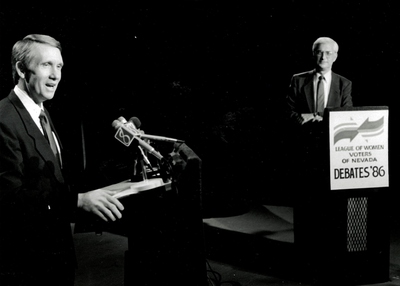
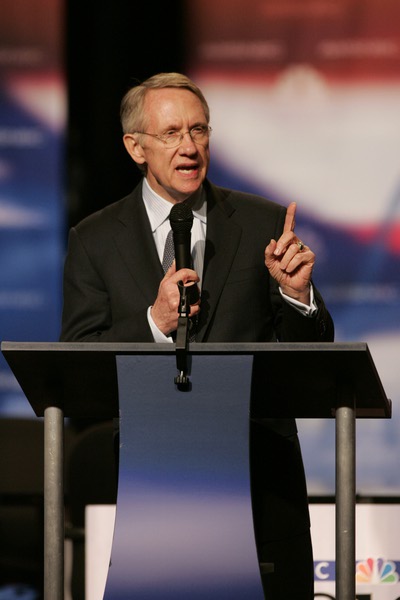
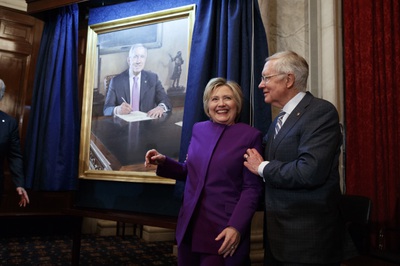
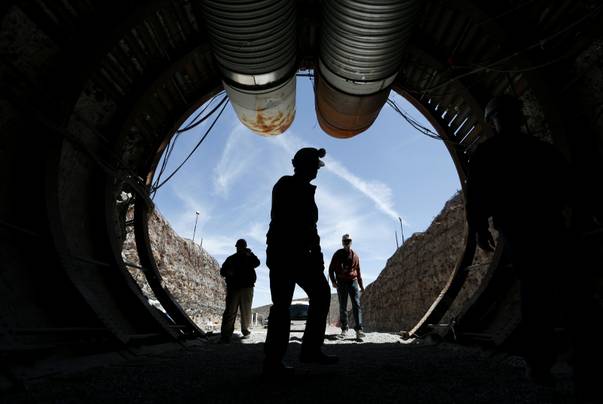

Join the Discussion:
Check this out for a full explanation of our conversion to the LiveFyre commenting system and instructions on how to sign up for an account.
Full comments policy